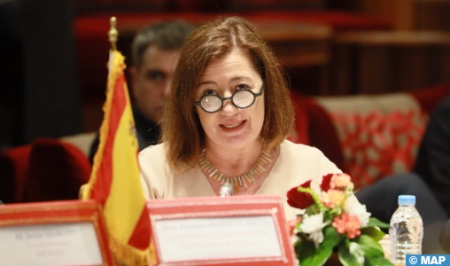Political Commitment, key to Tackling Geopolitical Challenges in Euro-Mediterranean Region – Francina Armengol –
President of the Congress of Deputies of the Kingdom of Spain and vice-president of the Parliamentary Assembly of the Union for the Mediterranean (PA-UfM), Francina Armengol, stressed on Thursday in Rabat the importance of political commitment in achieving sustainable development and meeting the geopolitical challenges of the Mediterranean region. Speaking at the 8th Summit of Speakers of the Parliaments Members of the Parliamentary Assembly of the Union for the Mediterranean, held on the occasion of the 17th PA-UfM plenary session, Armengol noted that the political commitment of all Mediterranean countries is essential to achieving sustainable development, as part of an integrated approach that takes into account current geopolitical challenges linked to migration, the climate crisis, energy, food security, natural disaster management, the digital transition and the promotion of gender equality in the region. Meeting these challenges will help to promote sustainable, green and circular economies that will reverse the loss of biodiversity in the Mediterranean region, strengthen supply chains weakened by successive geopolitical, energy and food crises, and establish cross-border agreements to manage environmental and humanitarian disasters and reduce the gap between the two shores of the Mediterranean, she noted. Armengol also called for the migration crisis to be tackled within the framework of a multidimensional approach that takes into account economic, commercial and social integration in the region, and for regular migration agreements to be established, as is the case between Morocco and Spain, two neighboring countries that have been a model of cooperation in this field in recent years, calling for actions based on common solidarity between member states and regional integration organizations, such as the Union for the Mediterranean, to promote legal migration movements. Regarding the Israeli-Palestinian conflict, the Spanish official stressed that the path to stability in the Middle East region “inevitably passes through the establishment of a horizon for a credible, lasting and definitive peace”, adding that Spain considers that this passes through the two-state solution, with the establishment of a viable Palestinian state, living side by side with Israel. For his part, vice-president of the European Parliament and vice-chairman of the PA-UfM, Marc Angel, pointed out that the Mediterranean region has suffered from several shocks caused by the global pandemic, the conflict between Russia and Ukraine, unresolved conflicts in Africa and Europe, and the conflict in Palestine, adding that “these crises continue to weaken global cooperation”. Angel also pointed out that this summit represents a unique opportunity to demonstrate our renewed commitment, since the challenges we face are common, notably the economic situation, employment trends, and the management of migratory flows and mobility, considering that these challenges can only be managed “in a spirit of cooperation, dialogue and solidarity”.

